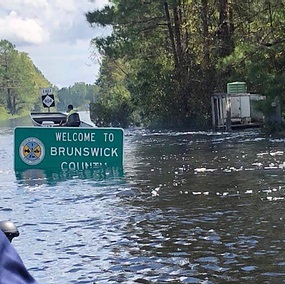What can natural disasters, like Florence, teach us?
Living through Hurricane Florence, touted as one of the worst disasters to hit North Carolina and the coast of the United States, was both unsettling and illuminating. With no electricity, the ‘get up and go’ of driving and the inability to do much of anything but remain safely at home, I had plenty of time to ponder. Among and in-between the constant flooding, tornado alerts and of course the rain, the constant, ever-present rain, I have come to terms with Nature’s sheer force and our mortal inability to control or tame it. The last time I had a similar appreciation was as a young teenager in the ocean’s surf. On a beautiful summer day, unexpectedly, I got caught up in a wave that brought my body crashing down with a power I had never before felt. My skin was effortlessly exposed to the gritty sharp-shelled surf. While hurling and twirling for what seemed like many agonizing minutes, I lost the ability to discern exactly which way was up to the precious air. I won’t lie – during that moment that seemed like minutes, panic set in. Fortunately, I found my footing and shakily walked to the shore, weak-kneed, but with a new appreciation for nature and how exacting her will can be.
Florence was no different. I, myself, programmed my phone to receive the constant tornadic warnings and alerts. In the early morning hours of Friday, September 14th, I laid awake feeling the same sense of panic I felt while being tumbled by that wave, but this time, I was facing hours, not just a moment in time. WECT was reporting the minute-by-minute activity of a tornadic cell near my home, in Monkey Junction. In the many days of ‘clean-up’ (which we were fortunate to be doing as many others were still without power, water, food, rations or even homes to return to) I had the opportunity to reflect more upon Mother Nature’s lessons.
For me and really for all of us, Florence solidified the importance of:
Having an updated estate plan that accurately reflects our current intentions and not the ones we may have given voice to 10 or more years ago. About what happens if we die, or become somehow incapacitated, whether suddenly and catastrophically, or progressively and slowly.
Storing those estate planning documents in a fire and waterproof safe – we consistently tell clients to spend $50-$100 on a solid fire and waterproof box, concealed and stored in a safe location, and informing their family members, particularly the ones they have appointed as agents or executors under their estate plan of the location and access information.
Thinking clearly and calmly in emergency situations when sometimes we only have minutes to make calculated decisions. I noticed the catastrophic loss of life during Florence, other than the absolute tragic and heart-wrenching situations – like the death of a small child and mother resulting from a tree falling on their home as they slept – occurred as the direct result of poor decisions made quickly and in a crisis. I am thinking of the people who – in the very moment- decided to break through barricades and drive onto flooded roads with fast-moving and rising waters. Certainly, we are sleep-deprived, anxious and often desperate during these times of crisis, which contributes to making poor decisions and even putting our lives and the lives of others, at risk. The ability to make clear, rational and well-thought-out decisions, even in a crisis, is absolutely key and within your grasp, just as your ability to do so in connection with aging.
We will enter into many experiences as we age. Whether in the face of a severe weather event, such as Florence, or an expected or unexpected health event, how we approach these events has everything to do with their outcomes and much to do with how well, and to what extent, we have pre-planned, and the energy and focus we apply to our decision-making at each turn.






















0 comments